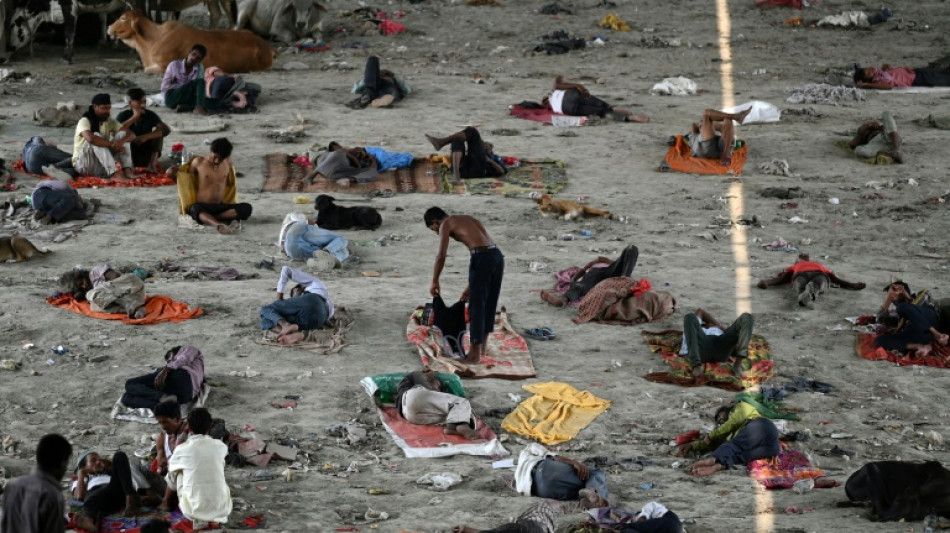
-
 World number one Alcaraz announces 'difficult' split with coach Ferrero
World number one Alcaraz announces 'difficult' split with coach Ferrero
-
Iran boxer sentenced to death at 'imminent' risk of execution: rights groups

-
 Snicko operator admits error that led to Carey's Ashes reprieve
Snicko operator admits error that led to Carey's Ashes reprieve
-
Finland PM apologises to Asian countries over MPs' mocking posts

-
 Doctors in England go on strike for 14th time
Doctors in England go on strike for 14th time
-
Romania journalists back media outlet that sparked graft protests

-
 Rob Reiner's son awaiting court appearance on murder charges
Rob Reiner's son awaiting court appearance on murder charges
-
Ghana's Highlife finds its rhythm on UNESCO world stage

-
 Stocks gain as traders bet on interest rate moves
Stocks gain as traders bet on interest rate moves
-
France probes 'foreign interference' after malware found on ferry

-
 Europe's Ariane 6 rocket puts EU navigation satellites in orbit
Europe's Ariane 6 rocket puts EU navigation satellites in orbit
-
Bleak end to the year as German business morale drops

-
 Hundreds queue at Louvre museum as strike vote delays opening
Hundreds queue at Louvre museum as strike vote delays opening
-
Bondi shooting shocks, angers Australia's Jewish community

-
 Markets rise even as US jobs data fail to boost rate cut bets
Markets rise even as US jobs data fail to boost rate cut bets
-
Senegal talisman Mane overcame grief to become an African icon

-
 Carey pays tribute to late father after home Ashes century
Carey pays tribute to late father after home Ashes century
-
'Many lessons to be learned' from Winter Games preparations, says ski chief

-
 Emotional Carey slams ton to give Australia upper hand in 3rd Ashes Test
Emotional Carey slams ton to give Australia upper hand in 3rd Ashes Test
-
Asian markets mixed as US jobs data fails to boost rate cut hopes

-
 Carey slams ton as Australia seize upper hand in third Ashes Test
Carey slams ton as Australia seize upper hand in third Ashes Test
-
Bondi shooting shocks, angers Australia Jewish community

-
 Myanmar junta seeks to prosecute hundreds for election 'disruption'
Myanmar junta seeks to prosecute hundreds for election 'disruption'
-
West Indies hope Christmas comes early in must-win New Zealand Test

-
 Knicks beat Spurs in NBA Cup final to end 52-year trophy drought
Knicks beat Spurs in NBA Cup final to end 52-year trophy drought
-
Khawaja revels in late lifeline as Australia 194-5 in 3rd Ashes Test

-
 Grief and fear as Sydney's Jewish community mourns 'Bondi rabbi'
Grief and fear as Sydney's Jewish community mourns 'Bondi rabbi'
-
Trump orders blockade of 'sanctioned' Venezuela oil tankers

-
 Brazil Senate to debate bill to slash Bolsonaro jail term
Brazil Senate to debate bill to slash Bolsonaro jail term
-
New Zealand ex-top cop avoids jail time for child abuse, bestiality offences

-
 Eurovision facing fractious 2026 as unity unravels
Eurovision facing fractious 2026 as unity unravels
-
'Extremely exciting': the ice cores that could help save glaciers

-
 Asian markets drift as US jobs data fails to boost rate cut hopes
Asian markets drift as US jobs data fails to boost rate cut hopes
-
What we know about Trump's $10 billion BBC lawsuit

-
 Ukraine's lost generation caught in 'eternal lockdown'
Ukraine's lost generation caught in 'eternal lockdown'
-
'Catastrophic mismatch': Safety fears as Jake Paul faces Anthony Joshua

-
 Australia's Steve Smith ruled out of third Ashes Test
Australia's Steve Smith ruled out of third Ashes Test
-
Khawaja grabs lifeline as Australia reach 94-2 in 3rd Ashes Test

-
 Undefeated boxing great Crawford announces retirement
Undefeated boxing great Crawford announces retirement
-
Trump says orders blockade of 'sanctioned' Venezuela oil tankers

-
 UK experiences sunniest year on record
UK experiences sunniest year on record
-
Australia holds first funeral for Bondi Beach attack victims

-
 FIFA announces $60 World Cup tickets after pricing backlash
FIFA announces $60 World Cup tickets after pricing backlash
-
Maresca relishes support of Chelsea fans after difficult week

-
 PayToMe.co Closes Acquisitions of Luggage To Ship, Ship And Storage, Ship To Box to Accelerate Global Expansion
PayToMe.co Closes Acquisitions of Luggage To Ship, Ship And Storage, Ship To Box to Accelerate Global Expansion
-
CXAI CEO Khurram Sheikh Reveals Agentic AI Strategy and Enterprise Momentum on Wall Street Reporter Livestream

-
 KIFFIK Biomedical Closes Oversubscribed Series A to Advance Real-Time Molecular Diagnostics Platform
KIFFIK Biomedical Closes Oversubscribed Series A to Advance Real-Time Molecular Diagnostics Platform
-
UniDoc Completes H3 Health Cube Installation in Italy

-
 Tax Extensions Don't Stop Interest - Clear Start Tax Breaks Down the Hidden Cost of Filing Late
Tax Extensions Don't Stop Interest - Clear Start Tax Breaks Down the Hidden Cost of Filing Late
-
Ondas Autonomous Systems and HEIDELBERG Enter Into Negotiations on the Establishment of a Cooperation


Heat records topple across sweltering Asia
Temperature records are being toppled across Asia, from India's summer to Australia's winter, authorities said Friday, in fresh evidence of the impact of climate change.
The sweltering temperatures match longstanding warnings from climate scientists and come as countries from Greece to Canada battle record heat and deadly wildfires.
In India, the world's most populous country, officials said this August was the hottest and driest since national records began more than a century ago.
The month falls in the middle of India's annual monsoon, which usually brings up to 80 percent of the country's yearly rainfall.
But despite heavy downpours that caused deadly floods in the country's north earlier this month, overall rainfall has been far below average.
August saw an average of just 161.7 millimetres (6.4 inches), 30.1 mm lower than the previous August record in 2005, the India Meteorological Department (IMD) said.
That has left the country baking in unrelenting heat.
"The large rainfall deficiency and weak monsoon condition is the main reason," the IMD said.
Authorities in Japan also said Friday that the country had experienced its hottest summer since records began in 1898.
Temperatures from June to August were "considerably higher" than average across the north, east and west of the country, the weather agency said.
In many locations "not only maximum temperatures but also minimum temperatures" reached record highs, it added.
And in Australia this winter was the warmest on record, with an average temperature of 16.75 degrees Celsius (62.15 Fahrenheit) for the season running from June to August.
That is a hair above a record set in 1996, and the highest average winter temperature since the country's records began in 1910, the Bureau of Meteorology said.
- 'More intense, more frequent' -
Climate change has fuelled searing temperatures across the globe already this year, with July the hottest month ever recorded on Earth.
Scientists have long warned that climate change produces heatwaves that are hotter, longer and more frequent.
And the warming El Nino weather pattern could turbocharge the heat further, though its effects are likely to become more apparent later in the year as it strengthens.
Heatwaves are among the deadliest natural hazards, with hundreds of thousands of people dying from preventable heat-related causes each year.
In developed countries, adaptations including air conditioning can help mitigate the impact.
But even in wealthy Japan, authorities said at least 53 people died of heatstroke in July, with almost 50,000 needing emergency medical attention.
The effects of heat are unevenly distributed, with small children and the elderly less able to regulate their body temperatures and thus more vulnerable.
Those who have to work outside are also particularly at risk.
Even a healthy young person will die after enduring six hours of 35-degree-Celsius (95 Fahrenheit) warmth coupled with 100 percent humidity.
But extreme heat does not need to be anywhere near that level to kill people, experts warn.
John Nairn, a senior extreme heat adviser at the UN's World Meteorological Organization (WMO), said last month that heatwaves are "becoming much more dangerous".
"It's the most rapidly emerging consequence of global warming that we are seeing," he told AFP in an interview.
"People are far too relaxed about the signs," he lamented.
"It will only get more intense and more frequent."
burs-sah/leg
M.Thompson--AMWN


